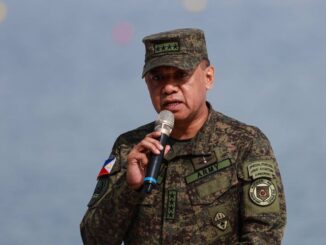
MANILA, Philippines — Some faculty members of the University of the Philippines have continued to condemn the university’s new agreement with the Armed Forces of the Philippines, citing concerns over its impact on academic freedom and its potential to normalize military presence on campus.
During a press conference on Wednesday, faculty members from the Defend UP Network, a coalition of UP students and staff for the defense of academic freedom, criticized the university administration for collaborating with an entity that has openly red-tagged and intimidated UP students and staff.
The “Declaration of Cooperation,” signed on August 8 and published on the university’s website on Monday, establishes a “framework for cooperation” between the military’s strategic studies office and the state university’s think tank, the UP Center for Integrative and Development Studies.
The non-binding agreement states that UP and the AFP have jointly “expressed their desire” to engage in research and publications, as well as personnel visits and research fellowships, among other areas of cooperation.
Collusion
The agreement goes against UP’s “long history and tradition as an academic institution that advocates for human rights and academic freedom,” said Rommel Rodriguez, member of the All U.P. Academic Employees Union and faculty member of the UP Diliman College of Arts and Letters.
“Is this truly cooperation or collusion? Is this a matter of scholarship or intelligence work? Is this in the interest of the UP community or the AFP?” Rodriguez said in Filipino during the press conference.
Mon Sy, a faculty member from the UP Diliman College of Arts and Letters and spokesperson for the Congress of Teachers/Educators for Nationalism and Democracy (CONTEND UP), warned that the agreement has already created a chilling effect on academic freedom and could jeopardize the university’s independence.
“How can faculty and students of UP question the state-sponsored killings dealt by elements of the AFP if they can freely visit campus spaces?” Sy said in an interview with Philstar.com.
“Visits, exchanges and research fellowships’ are forms of state interference that betray the very foundation of a university,” he added.
UP President Angelo Jimenez told Philstar.com in an interview on Tuesday that the declaration of cooperation is part of the university’s “policy of engagement” by sharing its scholarship with other government bodies.
Jimenez said the agreement was an opportunity for UP to engage the AFP in “really high scholarship” that will make them understand that red-tagging is illegal and unscientific.
For Danilo Arao, faculty member at the UP College of Mass Communication, the agreement serves as a “[public relations] boost” to the AFP, which has routinely accused UP campuses of being recruitment grounds for the Communist Party of the Philippines – New People’s Army.
In 2018, the AFP red-tagged UP and 17 other universities based on unverified information.
“Through this agreement, if another red-tagging incident takes place, they will justify this using the agreement,” Arao said.
“So it becomes a convenient excuse on the part of the AFP to continue its unacceptable ways,” he added.
Arao also questioned the need for a declaration between the university and the military as individual researchers are free to choose where to submit their work.
Rodriguez is also skeptical about Jimenez’s intent to promote human rights principles through the declaration, saying that the university president had allegedly dismissed a proposal to establish a university committee on academic freedom and human rights. The proposal had the support of several UP constituent universities and sectoral regents in 2023.
No attempt to revive the UP-DND accord
If there is any engagement the UP should have with the AFP, it should be about the restoration of its decades-long accord with the Department of National Defense, said Sy and Arao.
Then-Defense Secretary Delfin Lorenzana unilaterally terminated the accord in 2021 and justified this by claiming “ongoing clandestine recruitment” inside UP campuses.
“[CONTEND UP] maintains that, before any cooperation is made, the UP-DND Accord must be reinstated first, requiring the AFP and other state agencies to uphold the academic freedom of UP and its constituents,” Sy said.
“However, even then, to sign a [declaration] with the AFP during a time of rampant red-tagging and harrassment is an affront to the UP community,” he added.
The 1989 UP-DND accord, which only allowed security forces to enter university premises under limited conditions, is a post-Martial Law-era agreement that was drawn up after a UP student was taken from campus and later accused of involvement in murder.
The move to junk the agreement with UP was part of the government’s campaign against the Communist Party of the Philippines and New People’s Army, which Lorenzana said UP had become a “safe haven” and recruitment ground for.
RELATED: Labeling dissent as rebellion ‘institutionalized, normalized’ in Philippines — UN report | PNP chief: We ‘tolerate’ protests in UP, but don’t exercise your freedom too much





Be the first to comment